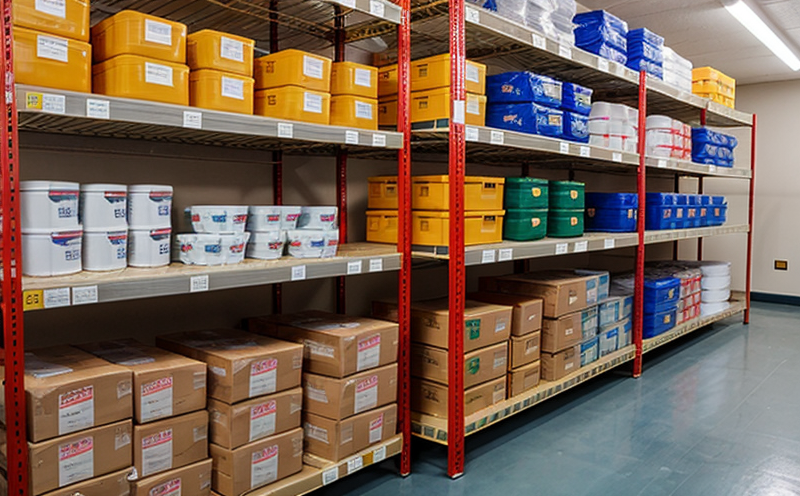Powder for Reconstitution Stability Testing
The pharmaceutical industry places a premium on ensuring that products remain stable and efficacious throughout their shelf life. Powder for reconstitution stability testing plays a crucial role in this process, as it helps manufacturers ensure the consistency of drug formulations before they reach the patient. This service involves subjecting powdered medications to various environmental conditions over time to monitor changes in physical properties like particle size distribution, dissolution rate, and chemical integrity.
Pharmaceutical companies rely on rigorous stability testing protocols to comply with international standards such as ISO 17853 and US FDA guidelines for stability testing of new drug products. Stability studies are often conducted at different temperature, humidity, and light exposure levels to simulate real-world storage conditions. This helps in identifying potential issues early on so that corrective actions can be taken before the product reaches the market.
The process typically begins with sample preparation where the powdered material is accurately weighed and mixed according to predefined ratios. Samples are then divided into multiple batches, each subjected to varying environmental stressors for a specified duration. Temperature-controlled chambers and humidity cabinets are used to simulate different storage conditions. Light stability studies may also be conducted using xenon arc lamps or other light sources.
Throughout the testing period, critical parameters such as moisture content, pH levels, color change, and dissolution profiles are monitored regularly. Advanced analytical techniques like ASTM D4785 for particle size analysis and ISO 5696 for pH measurement are employed to ensure precise data collection. Once the study period is complete, results are analyzed comprehensively to determine whether the product meets regulatory requirements.
This testing not only ensures compliance with regulatory bodies but also enhances patient safety by preventing potentially harmful variations in drug performance over time. By identifying any deviations from expected behavior early in development, companies can make informed decisions about formulation adjustments or process improvements that could impact long-term stability.
For instance, if a particular excipient shows signs of hydrolysis under certain conditions, this information would be invaluable for optimizing production processes to maintain consistent quality throughout the shelf life. Additionally, understanding how environmental factors influence drug stability allows for more accurate labeling regarding storage instructions and expiration dates.
In summary, powder for reconstitution stability testing is an essential component of ensuring that pharmaceutical products remain safe, effective, and reliable over their intended use period. Through meticulous planning, execution, and analysis, this service helps safeguard public health while maintaining high standards within the industry.
Quality and Reliability Assurance
- Temperature Control: Maintaining precise temperature ranges during storage to simulate various environmental conditions.
- Humidity Management: Controlling humidity levels accurately to assess the impact on product integrity.
- Light Exposure: Using standardized light sources to evaluate photostability of products.
- Analytical Methods: Employing advanced instrumentation like HPLC, GC, and FTIR for thorough analysis.
- Data Collection: Gathering comprehensive data on physical properties at regular intervals throughout the study.
- Compliance Verification: Ensuring adherence to relevant international standards such as ISO 17853 and FDA regulations.
The quality assurance team plays a pivotal role in overseeing these aspects, ensuring that all tests are conducted according to best practices. They also review data meticulously for any anomalies or trends that might indicate potential issues with the product formulation.
Customer Impact and Satisfaction
Patient trust is paramount in the pharmaceutical sector. Ensuring consistent quality through thorough stability testing instills confidence among healthcare providers and consumers alike. Reliable products mean better treatment outcomes, fewer recalls, and enhanced reputation for both individual companies and the industry as a whole.
From an operational perspective, successful stability testing reduces risks associated with non-compliance penalties or product withdrawals due to quality concerns. It also streamlines supply chain management by providing clear guidance on optimal storage conditions. Furthermore, it supports continuous improvement initiatives aimed at enhancing product performance and patient safety.
Ultimately, this service contributes significantly towards improving overall customer satisfaction levels by delivering products that meet the highest standards of reliability and effectiveness.
Competitive Advantage and Market Impact
In today’s highly competitive market, maintaining robust quality assurance measures is critical for sustaining a leading position. By excelling in stability testing, manufacturers can differentiate themselves by demonstrating superior commitment to product integrity and patient well-being. This not only enhances brand reputation but also fosters long-term relationships with key stakeholders.
Moreover, consistent results from stability studies enable companies to accurately predict shelf life, thereby optimizing inventory management strategies. Efficient resource allocation leads to cost savings while ensuring continuous availability of essential medications. Such operational efficiencies contribute positively to profitability margins and competitive positioning within the market.
In conclusion, investing in comprehensive powder for reconstitution stability testing offers numerous benefits beyond mere regulatory compliance. It strengthens brand loyalty, drives operational excellence, and ultimately contributes to sustained success in an increasingly challenging healthcare landscape.





